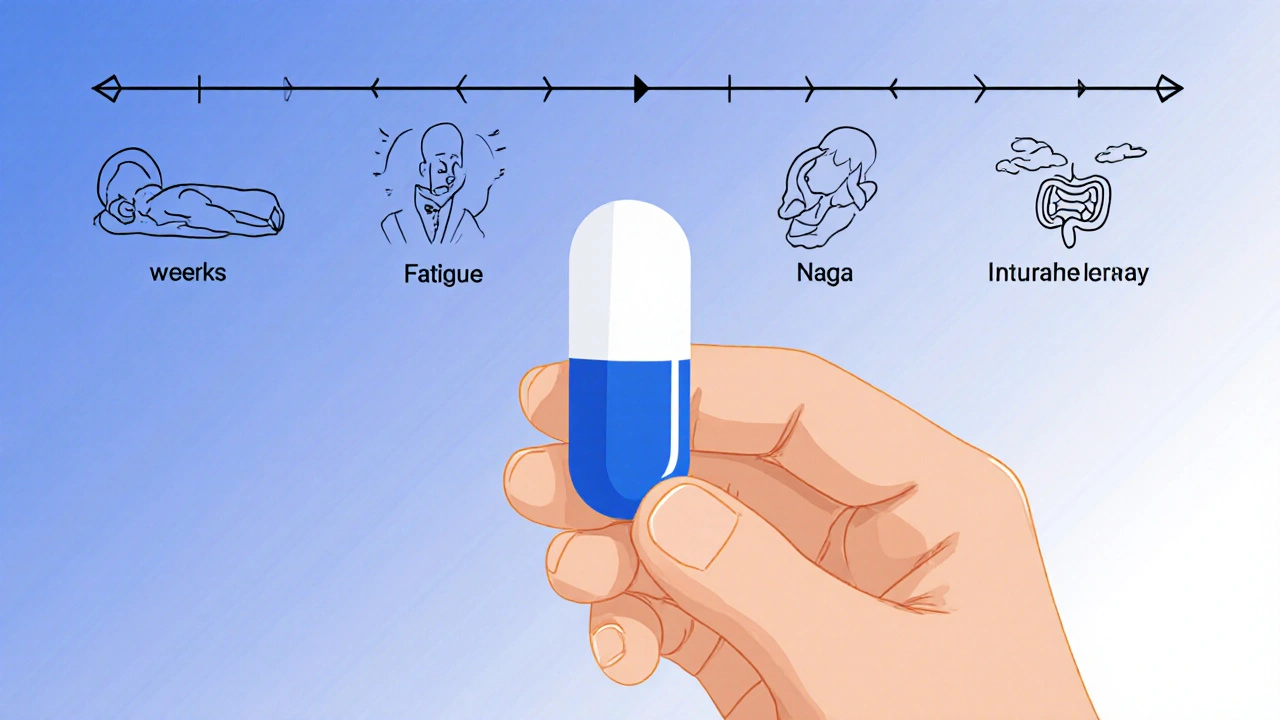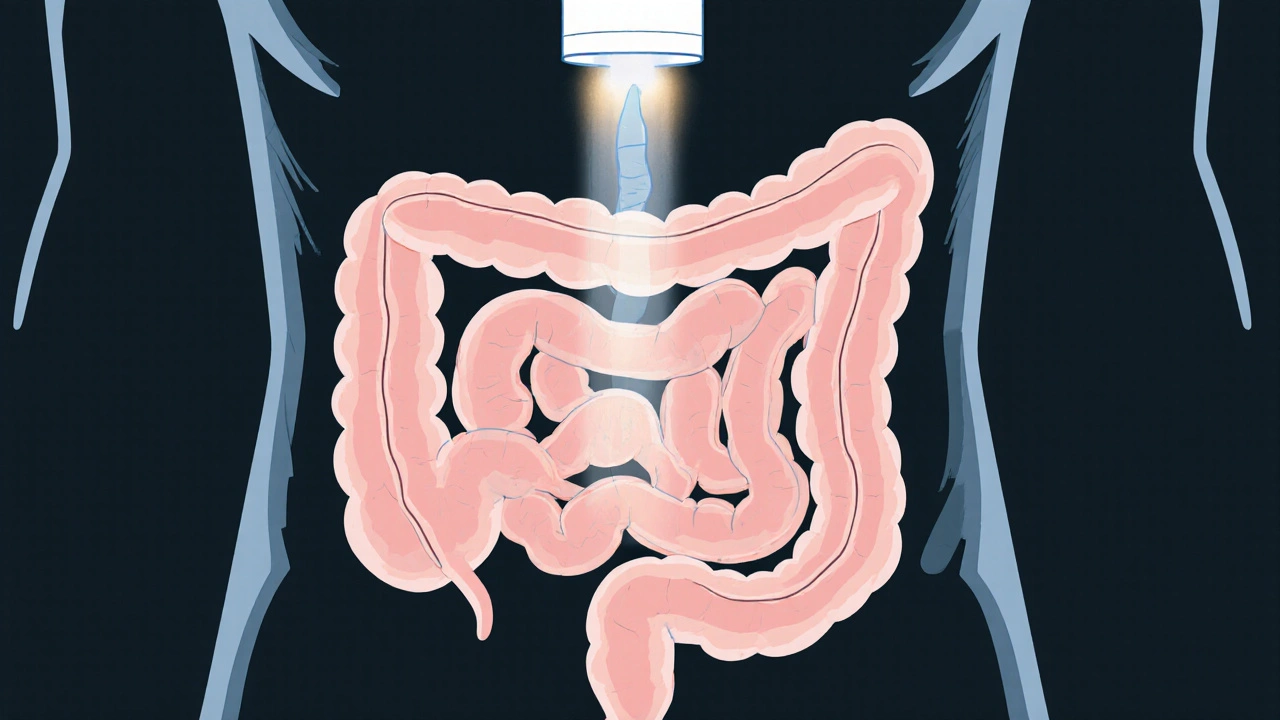Entocort isn’t a household name like ibuprofen or insulin, but for people living with Crohn’s disease, it can be a game-changer. Unlike older steroids that flood your whole body with hormones, Entocort targets inflammation right where it hurts - in your intestines. It’s designed to deliver relief without the heavy side effects that come with traditional corticosteroids. If you’ve been told you need treatment for mild to moderate Crohn’s disease, especially in the ileum or ascending colon, Entocort might be on your doctor’s shortlist.
What exactly is Entocort?
Entocort is the brand name for budesonide, a synthetic corticosteroid. It’s not your grandfather’s prednisone. While prednisone affects your entire immune system, budesonide is engineered to act locally. When you swallow an Entocort capsule, it releases its active ingredient slowly in the lower part of your small intestine and upper colon - the exact areas where Crohn’s inflammation often flares up.
The key innovation? Budesonide gets broken down quickly by the liver after it does its job. This means very little of the drug enters your bloodstream. That’s why people on Entocort rarely get moon face, weight gain, or bone thinning - the classic side effects of long-term steroid use. It’s targeted. It’s smart. And for many, it’s the first steroid they can tolerate without feeling like they’ve been hit by a truck.
How does Entocort work in Crohn’s disease?
Crohn’s disease is an inflammatory bowel condition. Your immune system mistakenly attacks the lining of your digestive tract, causing swelling, ulcers, pain, and diarrhea. In mild to moderate cases, doctors want to calm that inflammation without knocking out your entire immune system.
Entocort works by binding to glucocorticoid receptors in the gut wall. This turns down the production of inflammatory chemicals like cytokines and prostaglandins. Think of it like turning off a fire alarm that’s ringing too loudly - the alarm (inflammation) is still there, but it’s no longer screaming.
Unlike systemic steroids, Entocort doesn’t suppress adrenal function as much because the liver clears over 90% of it before it circulates widely. A 2023 study in the European Journal of Gastroenterology showed that 7 out of 10 patients with active ileal Crohn’s went into remission after eight weeks on Entocort. That’s a solid success rate for a drug meant to avoid long-term steroid damage.
Who gets prescribed Entocort?
Entocort isn’t for everyone with IBD. It’s specifically approved for adults with:
- Mild to moderate active Crohn’s disease affecting the terminal ileum or ascending colon
- Patients who haven’t responded well to mesalamine or other 5-ASA drugs
- Those needing steroid treatment but wanting to avoid systemic side effects
It’s not used for severe flare-ups requiring hospitalization. It’s also not a maintenance drug - you don’t take it forever. Doctors typically prescribe it for 8 weeks. After that, they switch you to something else to keep the inflammation under control, like azathioprine or biologics.
People with liver disease need lower doses. If you’ve had tuberculosis or fungal infections, your doctor will check for reactivation risks. And if you’re pregnant or breastfeeding, talk to your gastroenterologist - budesonide crosses the placenta in small amounts, but studies show it’s generally safer than prednisone.
How do you take Entocort?
Entocort comes in 3 mg capsules. The standard dose is 9 mg per day - that’s three capsules - taken in the morning with water. You must swallow them whole. Don’t crush, chew, or open them. The capsule has a special coating that only dissolves in the ileum. If you break it open, the drug gets absorbed too early and won’t work properly.
Take it on an empty stomach, at least one hour before breakfast. Food can interfere with how the coating works. Most people notice symptom improvement within 7 to 14 days. Full results usually show up by week 6.
Some patients report a metallic taste or mild nausea at first. These usually fade. If you get headaches, dizziness, or trouble sleeping, tell your doctor. These are signs the drug is leaking into your system more than it should.

Side effects: What to watch for
Because Entocort is designed to be local, most side effects are mild. But no steroid is risk-free.
- Headache (reported in 1 in 10 users)
- Nausea or stomach upset
- Acne or skin thinning (rare)
- Increased susceptibility to infections (like colds or yeast infections)
- Adrenal suppression (only if taken longer than 8 weeks)
More serious side effects - like high blood pressure, cataracts, or osteoporosis - are rare with short-term use. But if you’ve been on Entocort more than once, your doctor may order a bone density scan. Repeated steroid exposure, even targeted ones, can add up over time.
One thing to never ignore: if you feel suddenly weak, dizzy, or nauseated after stopping Entocort, you might be experiencing adrenal insufficiency. Your body needs time to restart its own cortisol production. Never stop cold turkey. Always taper off under medical supervision.
Entocort vs. prednisone: The real difference
Many patients ask: “Why not just take prednisone? It’s cheaper.”
Here’s the truth: prednisone works faster and stronger - but at a cost. A 2024 meta-analysis in Gut journal compared budesonide and prednisone in 1,200 Crohn’s patients. Both had similar remission rates after 8 weeks. But prednisone users were 3 times more likely to develop:
- Weight gain (over 10% of body weight)
- Mood swings or insomnia
- Bone density loss
- Diabetes or high blood sugar
Entocort costs more upfront - about £60-£80 for a 28-day course in the UK NHS. But if you avoid hospital visits, missed work, or long-term steroid damage, it often pays for itself.
What happens after Entocort?
Entocort isn’t a cure. It’s a bridge. Once your inflammation is under control - usually after 8 weeks - your doctor will start you on a maintenance therapy. That might be:
- Immunomodulators like azathioprine or 6-MP
- Biologics like adalimumab (Humira) or vedolizumab (Entyvio)
- Or sometimes, low-dose mesalamine
Some patients stay on maintenance for years. Others go into long-term remission and don’t need anything else. The goal isn’t just to feel better now - it’s to prevent damage to your intestines over time. Untreated inflammation leads to strictures, fistulas, and surgery.
That’s why follow-up colonoscopies matter. Even if you feel fine, your doctor might want to see how the lining of your gut has healed. Healing isn’t just about symptoms - it’s about tissue repair.

Can you buy Entocort over the counter?
No. Entocort is a prescription-only medication in the UK and most countries. You can’t get it from a pharmacy without a signed prescription from a gastroenterologist or GP with specialist training in IBD.
Some online pharmacies claim to sell it without a script. Don’t risk it. Fake or contaminated versions exist. And without proper monitoring, you could miss signs of adrenal suppression or infection.
If cost is a barrier, ask your doctor about NHS prescription exemptions. Many people with chronic conditions like Crohn’s qualify for free prescriptions in the UK. You can also ask about generic budesonide - it’s the same drug, just cheaper.
Real stories: What patients say
Emma, 34, from Bristol, was on prednisone twice before switching to Entocort. “The first time I took prednisone, I gained 18 pounds in two months. I looked like a different person. I couldn’t sleep. I cried for no reason. With Entocort, I had a little headache for three days, then I felt like myself again. I didn’t gain weight. I didn’t feel crazy. I just got better.”
James, 47, from Leeds, took Entocort after his first flare-up. “I was scared to take steroids. But my doctor explained how it worked in my gut. I didn’t realize it was designed to be safe. Now I’m on maintenance therapy and haven’t had a flare in 18 months.”
These aren’t outliers. They’re typical. Entocort gives people back their lives without the heavy toll of older drugs.
Final thoughts: Is Entocort right for you?
If you’ve been diagnosed with Crohn’s disease and your inflammation is limited to the end of your small intestine or the start of your colon, Entocort could be the most sensible first steroid option. It’s precise. It’s safer. And for most people, it works.
But it’s not magic. It won’t fix everything. You still need to eat right, manage stress, and stick with your long-term plan. And you still need to see your doctor regularly.
Don’t be afraid to ask questions. Ask about alternatives. Ask about side effects. Ask what happens after the 8 weeks. The more you know, the more control you have over your health - and that’s the real goal.


Written by Felix Greendale
View all posts by: Felix Greendale